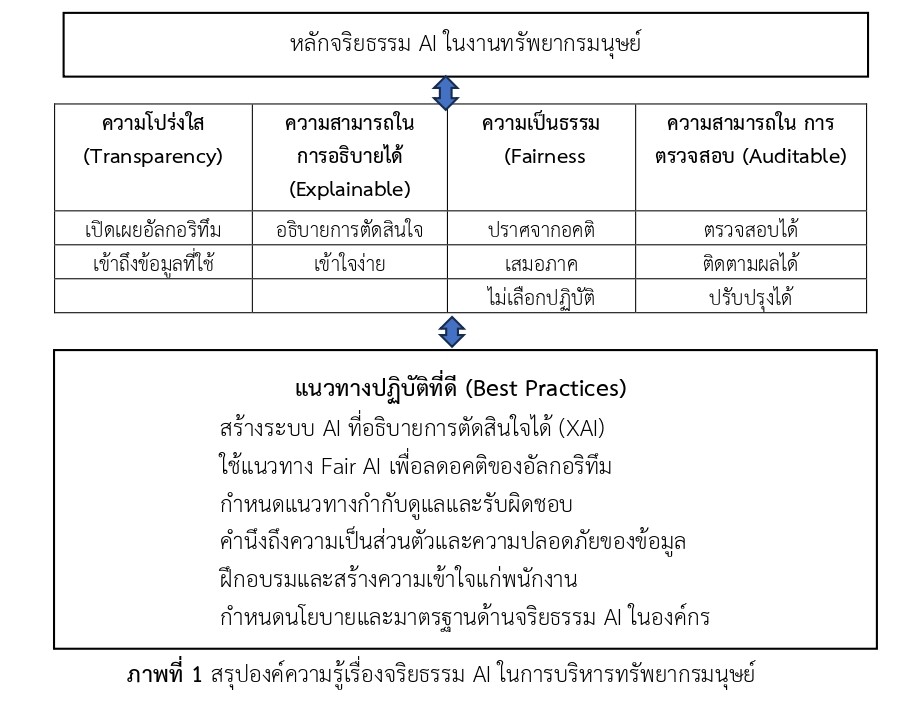ETHICS IN THE RESPONSIBLE USE OF ARTIFICIAL INTELLIGENCE IN HUMAN RESOURCE DECISION-MAKING
Keywords:
Artificial Intelligence, Human Resource Management, Ethics, TransparencyAbstract
Artificial Intelligence (AI) has become increasingly significant in human resource management, particularly in recruitment, selection, performance evaluation, and employee development. With its capability to analyze big data and accurately AI offers tremendous potential for improving HR processes. However, the integration of AI in human resource management faces several ethical challenges, including algorithmic bias, transparency in decision-making, data privacy, and corporate accountability in utilizing this technology. This study aims to analyze ethical issues in the application of AI in human resources and present responsible approaches to utilizing AI that minimize potential ethical risks. This paper focuses on analyzing ethical approaches to using AI in human resource management, emphasizing four key ethical principles: transparency, explainability and interpretability, fairness, and auditability. It presents case studies, both positive and negative, to highlight the potential impacts of AI implementation in human resource management. Furthermore, the paper proposes the best practices for designing and developing AI systems that enable fair and responsible decision-making. Adherence to these four ethical principles strengthens trust between organizations and employees, enhances the effectiveness of human resource decision-making, and enables organizations to fully leverage AI capabilities while maintaining social responsibility. This balanced approach ensures that technological advancement in HR practices enhances rather than undermines fairness, creating a workplace where AI serves as a tool for more effective and ethical human resource management.
References
บุญทัน ดอกไธสง. (2567). การปฎิวัติปัญญาประดิษฐ์ ในรัฐประศาสนศาสตร์ขั้นสูง. กรุงเทพฯ: โรงพิมพ์มหาจุฬาลงกรณราชวิทยาลัย.
ชลธิชา ทักษิณาเวศน์. (2568). สังคมเหลื่อมล้ำทางเพศฉันใด เอไอก็มีอคติทางเพศฉันนั้น. สืบค้น 31 มกราคม 2568, จาก https://www.the101.world/bias-in-artificial-intelligence/
IEEE Global Initiative on Ethics of Autonomous and Intelligent Systems. (2022). Ethically Aligned Design: A Vision for Prioritizing Human Well-being with Autonomous and Intelligent Systems. Retrieved January 31, 2025, from https://standards.ieee.org/industryconnections/ec/autonomous systems/
Cormen, T.H. et al., (2022). Introduction to Algorithms (4th ed.). Cambridge, Massachusetts: MIT Press.
Deloitte. (2023). Global Human Capital Trends 2023. Retrieved January 31, 2025, from https://www2.deloitte.com/global/en/pages/human-capital/articles/human-capital-trends.html
IBM. (2023). Watson Recruitment: Transform your talent acquisition strategy. Retrieved January 31, 2025, from https://www.ibm.com/products/watson-recruitment
IEEE Global Global Initiative on Ethics of Autonomous and Intelligent Systems.
IEEE. (2023). IEEE 7000-2023 - IEEE Standard Model Process for Addressing Ethical Concerns during System Design. Retrieved January 31, 2025, from https://standards.ieee.org/ieee/7000/7027/
Jeffrey, D. (2561). Insight - Amazon scraps secret AI recruiting tool that showed bias against women. Retrieved January 31, 2025, from https://www.reuters.com/article/world/insight-amazon-scraps-secret-ai-recruiting-tool-that-showed-bias-against-women-idUSKCN1MK0AG/
Johnson, R.D. & Phillips, G. (2023). AI-driven recruitment: Promises and pitfalls.
Russell, S., & Norvig, P. (2021). Artificial Intelligence: A Modern Approach (4th ed.). Hoboken: Pearson.

Downloads
Published
How to Cite
Issue
Section
Categories
License
Copyright (c) 2025 Academic Journal of Political Science and Public Administration

This work is licensed under a Creative Commons Attribution-NonCommercial-NoDerivatives 4.0 International License.




